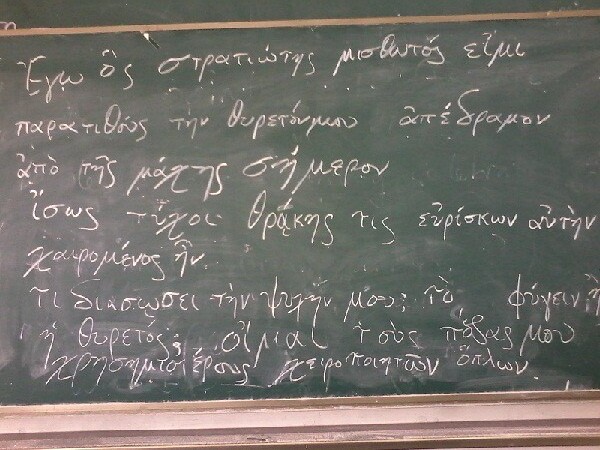Archilochus 6 D. 5 W "Lost my shield!"
Posted: March 17th, 2015, 5:41 pm
Archilochus 6 D. 5 W. "Lost my shield!"
Perhaps a mercenary soldier, the poet expresses his disdain for the heroic ideal of a brave death on the battlefield; centuries later, Horace emulated Archilochus, noting in a Latin poem that he abandoned his shield and the Roman Republican cause on the field of the battle of Philippi in 42 BCE.
Meter: Elegiac couplet: the first line is a dactylic hexameter, the meter of the Homeric poems; the second line is most simply understood as half of a dactylic hexameter with a strong stop followed by another half dactylic hexameter. I’ve marked in bold print the syllables bearing the beat.
1 ἀσπίδι μὲν Σαΐων τις ἀγάλλεται, ἣν παρὰ θάμνωι
2 ἔντος ἀμώμητον | κάλλιπον οὐκ ἐθέλων,
3 αὐτὸς δ᾽ ἐξέφυγον θανάτου τέλος. ἀσπὶς ἐκείνη
4 ἐρρέτω· ἐξαῦτις | κτήσομαι οὐ κακίω.
line 1 ἀσπίς, -ίδος, ἡ: shield;
line 1 Σαΐων: gen. pl, dependent on τις; who were the Saians? I have no idea, but one of them is the proud possessor ...
line 1 ἀγάλλεσθαι + dat.: take delight (in), rejoice (cf. Koine ἀγαλλιᾶσθαι)
line 1 ἢν: antecedent is ἀσπίδι
line 1 θάμνος, -ου, ὁ: bush, shurb
line 2 ἔντος, -ους, τό: weapon, instrument
line 2 ἀμώμητος/ον: faultless, blameless (α-privative + μέμφεσθαι: find fault
line 2 κάλλιπον: syncopated form of κατέλιπον < καταλείπειν: abandon
line 3 αὐτὸς: intensive with the implicit subject of ἐξέφυγον (ἐκφεύγειν: evade)
line 3 θανάτου τέλος: interesting expression: death is a limit, an end, a goal — “end of one’s rope” or “end of the line”; τελεύτη (end) ordinarily means “death”; τελευτᾶν ordinarily means “die” (come to an end)
line 3 ἐκείνη: the demonstrative here has a distancing effect, the shield is just one of its kind, not the defining attribute of a warrior who, if he is the man he “ought” to be, is either the bearer of the shield or the one borne upon that shield (away from the battlefield); note also the effect of the position of ἐκείνη at the end of the line with a pause before the new line begins with the verbal complement of ἀσπὶς ἐκείνη.
line 4 ἐρρέτω: imperative 3d sg. of ἔρρειν, “be gone” (present tense with stative sense); ἐρρέτω has overtones of “To hell with it!” or “Good riddance to it!”
line 4 ἐξαῦτις: adv.: hereafter, with overtones of “soon enough”
line 4 κτήσομαι: κτᾶσθαι: acquire
line 4 κακίω (contraction from κακίοσα: acc. sg. comparative of κακός/ή/όν, “worthless” — the poet expects to be the possessor soon enough of a shield every bit as good as the one he has abandoned.
Perhaps a mercenary soldier, the poet expresses his disdain for the heroic ideal of a brave death on the battlefield; centuries later, Horace emulated Archilochus, noting in a Latin poem that he abandoned his shield and the Roman Republican cause on the field of the battle of Philippi in 42 BCE.
Meter: Elegiac couplet: the first line is a dactylic hexameter, the meter of the Homeric poems; the second line is most simply understood as half of a dactylic hexameter with a strong stop followed by another half dactylic hexameter. I’ve marked in bold print the syllables bearing the beat.
1 ἀσπίδι μὲν Σαΐων τις ἀγάλλεται, ἣν παρὰ θάμνωι
2 ἔντος ἀμώμητον | κάλλιπον οὐκ ἐθέλων,
3 αὐτὸς δ᾽ ἐξέφυγον θανάτου τέλος. ἀσπὶς ἐκείνη
4 ἐρρέτω· ἐξαῦτις | κτήσομαι οὐ κακίω.
line 1 ἀσπίς, -ίδος, ἡ: shield;
line 1 Σαΐων: gen. pl, dependent on τις; who were the Saians? I have no idea, but one of them is the proud possessor ...
line 1 ἀγάλλεσθαι + dat.: take delight (in), rejoice (cf. Koine ἀγαλλιᾶσθαι)
line 1 ἢν: antecedent is ἀσπίδι
line 1 θάμνος, -ου, ὁ: bush, shurb
line 2 ἔντος, -ους, τό: weapon, instrument
line 2 ἀμώμητος/ον: faultless, blameless (α-privative + μέμφεσθαι: find fault
line 2 κάλλιπον: syncopated form of κατέλιπον < καταλείπειν: abandon
line 3 αὐτὸς: intensive with the implicit subject of ἐξέφυγον (ἐκφεύγειν: evade)
line 3 θανάτου τέλος: interesting expression: death is a limit, an end, a goal — “end of one’s rope” or “end of the line”; τελεύτη (end) ordinarily means “death”; τελευτᾶν ordinarily means “die” (come to an end)
line 3 ἐκείνη: the demonstrative here has a distancing effect, the shield is just one of its kind, not the defining attribute of a warrior who, if he is the man he “ought” to be, is either the bearer of the shield or the one borne upon that shield (away from the battlefield); note also the effect of the position of ἐκείνη at the end of the line with a pause before the new line begins with the verbal complement of ἀσπὶς ἐκείνη.
line 4 ἐρρέτω: imperative 3d sg. of ἔρρειν, “be gone” (present tense with stative sense); ἐρρέτω has overtones of “To hell with it!” or “Good riddance to it!”
line 4 ἐξαῦτις: adv.: hereafter, with overtones of “soon enough”
line 4 κτήσομαι: κτᾶσθαι: acquire
line 4 κακίω (contraction from κακίοσα: acc. sg. comparative of κακός/ή/όν, “worthless” — the poet expects to be the possessor soon enough of a shield every bit as good as the one he has abandoned.
